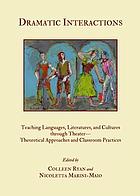Paste this search into WorldCat: su: "drama in education"
 Dramathemes : classroom literacy that will excite, surprise, and stimulate learnin
by
Dramathemes : classroom literacy that will excite, surprise, and stimulate learnin
by
 Dramatic Interactions : teaching languages, literatures, and cultures through theater : theoretical approaches and classroom practices
by
Dramatic Interactions : teaching languages, literatures, and cultures through theater : theoretical approaches and classroom practices
by
Topic: The uses of drama in the education of children